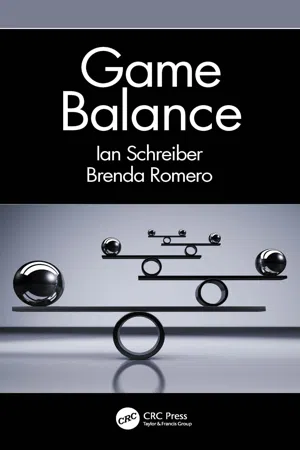
- 760 pages
- English
- ePUB (mobile friendly)
- Available on iOS & Android
Game Balance
About this book
Within the field of game design, game balance can best be described as a black art. It is the process by which game designers make a game simultaneously fair for players while providing them just the right amount of difficulty to be both exciting and challenging without making the game entirely predictable. This involves a combination of mathematics, psychology, and occasionally other fields such as economics and game theory.
Game Balance offers readers a dynamic look into game design and player theory. Throughout the book, relevant topics on the use of spreadsheet programs will be included in each chapter. This book therefore doubles as a useful reference on Microsoft Excel, Google Spreadsheets, and other spreadsheet programs and their uses for game designers.
FEATURES
- The first and only book to explore game balance as a topic in depth
- Topics range from intermediate to advanced, while written in an accessible style that demystifies even the most challenging mathematical concepts to the point where a novice student of game design can understand and apply them
- Contains powerful spreadsheet techniques which have been tested with all major spreadsheet programs and battle-tested with real-world game design tasks
- Provides short-form exercises at the end of each chapter to allow for practice of the techniques discussed therein along with three long-term projects divided into parts throughout the book that involve their creation
- Written by award-winning designers with decades of experience in the field
Ian Schreiber has been in the industry since 2000, first as a programmer and then as a game designer. He has worked on eight published game titles, training/simulation games for three Fortune 500 companies, and has advised countless student projects. He is the co-founder of Global Game Jam, the largest in-person game jam event in the world. Ian has taught game design and development courses at a variety of colleges and universities since 2006.
Brenda Romero is a BAFTA award-winning game director, entrepreneur, artist, and Fulbright award recipient and is presently game director and creator of the Empire of Sin franchise. As a game director, she has worked on 50 games and contributed to many seminal titles, including the Wizardry and Jagged Alliance series and titles in the Ghost Recon, Dungeons & Dragons, and Def Jam franchises.
Tools to learn more effectively

Saving Books

Keyword Search

Annotating Text

Listen to it instead
Information
Part I

1

- What is Game Balance?
- Kinds of Game Balance
- Balance as Fairness
- How Do We Know if a Game is Balanced?
- How Do You Balance a Game?
- A Note about Math
What Is Game Balance?
- “That boss battle was way too easy.”
- “This weapon is way overpowered.”
- “The original Starcraft is the most well-balanced game I’ve ever played.”
- “Betrayal at House on the Hill is a lot of fun. Totally unbalanced, but fun.”
- “This character class was nerfed too much.”
- “Magic: the Gathering was doing pretty well for awhile, but Tolarian Academy really destroyed the balance of the environment while it was out there.”
- “Bloodborne is super challenging, and it’s supposed to be.”
- “I died 100 times an hour in Super Hexagon. I think I have the hang of it now.”
Kinds of Game Balance
Mathematical Balance
Balanced Difficulty
Balanced Progression
Table of contents
- Cover
- Half Title
- Title Page
- Copyright Page
- Dedication
- Table of Contents
- List of Case Studies
- Acknowledgments
- Preface
- Authors
- Part I Game Balance
- Part II The Mathematics of Balance
- 18 Dependent Randomness
- 19 Managing Luck and Skill
- 20 Probability and Human Intuition
- 21 Pseudorandom Numbers
- 22 Infinite Probability
- 23 Situational Balance
- 24 Statistics
- 25 Intransitive Mechanics and Payoff Matrices
- Part III Spreadsheets
- Appendix: Game Genres
- Index
Frequently asked questions
- Essential is ideal for learners and professionals who enjoy exploring a wide range of subjects. Access the Essential Library with 800,000+ trusted titles and best-sellers across business, personal growth, and the humanities. Includes unlimited reading time and Standard Read Aloud voice.
- Complete: Perfect for advanced learners and researchers needing full, unrestricted access. Unlock 1.4M+ books across hundreds of subjects, including academic and specialized titles. The Complete Plan also includes advanced features like Premium Read Aloud and Research Assistant.
Please note we cannot support devices running on iOS 13 and Android 7 or earlier. Learn more about using the app